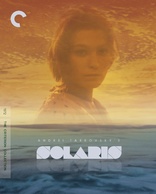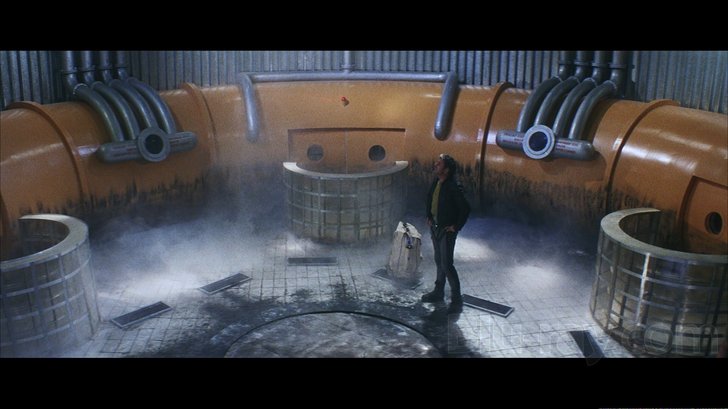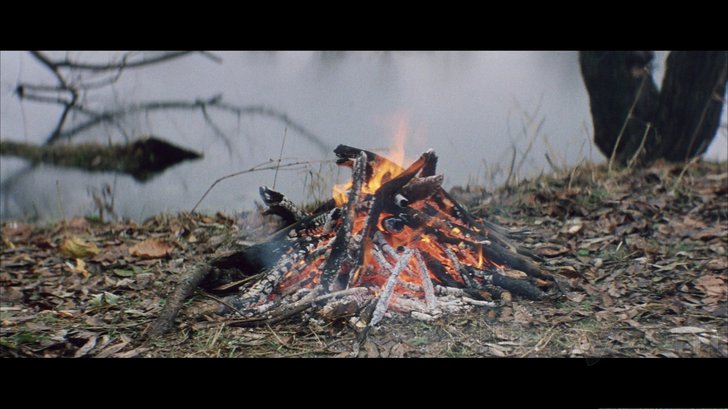Solaris Blu-ray Movie
HomeSolaris Blu-ray Movie 
Солярис / SolyarisCriterion | 1972 | 167 min | Not rated | May 24, 2011

Movie rating
8 | / 10 |
Blu-ray rating
| Users | 5.0 | |
| Reviewer | 4.5 | |
| Overall | 4.5 |
Overview
Solaris (1972)
Ground control has been receiving mysterious transmissions from the three remaining residents of the Solaris space station. When cosmonaut and psychologist Kris Kelvin is dispatched to investigate, he experiences the same strange phenomena that afflict the Solaris crew, sending him on a voyage into the darkest recesses of his consciousness.
Starring: Donatas Banionis, Natalya Bondarchuk, Jüri Järvet, Vladislav Dvorzhetskiy, Nikolay GrinkoDirector: Andrei Tarkovsky
| Drama | Uncertain |
| Foreign | Uncertain |
| Mystery | Uncertain |
| Romance | Uncertain |
| Sci-Fi | Uncertain |
Specifications
Video
Video codec: MPEG-4 AVC
Video resolution: 1080p
Aspect ratio: 2.37:1
Original aspect ratio: 2.39:1
Audio
Russian: LPCM Mono (48kHz, 24-bit)
Subtitles
English
Discs
50GB Blu-ray Disc
Single disc (1 BD)
Playback
Region A (locked)
Review
Rating summary
| Movie | 5.0 | |
| Video | 4.0 | |
| Audio | 4.0 | |
| Extras | 4.5 | |
| Overall | 4.5 |
Solaris Blu-ray Movie Review
Reviewed by Dr. Svet Atanasov May 18, 2011Winner of the Grand Prize of the Jury at the Cannes Film Festival, Andrei Tarkovsky's "Solaris" (1972) arrives on Blu-ray courtesy of Criterion. The supplemental features on the disc include an audio commentary with film scholars Vida Johnson and Graham Petrie; interviews with actress Natalya Bondarchuk, cinematographer Vadim Yusov, production designer Mikhail Romadin, and composer Eduard Artemyev; deleted and Alternate scenes; and more. The disc also arrives with a 20-page illustrated booklet containing Phillip Lopate's essay "Inner Space" and Akira Kurosawa's "Tarkovsky and Solaris". In Russian, with optional English subtitles for the main feature. Region-A "locked".

What happened here?
Andrei Tarkovsky’s legendary Solaris is a product of its time. It is a long and slow film that demands patience, a virtue modern audiences seem to lack. It is a film in which the atmosphere is a lot more important than the narrative and its characters. It is also a Soviet film that was carefully scrutinized by the Soviet censors before it was approved for release.
Kris (Donatas Banionis, Depressiya) is a space psychologist who has been asked to assist with a puzzling case involving the Soviet space station Solaris, which the government is considering closing down. Before he leaves Earth, he is shown various clips from a scientific conference where it is revealed that the station’s crew members have began suffering intense hallucinations.
At Solaris, Kris is shocked to discover that one of the crew members has already committed suicide. The scientist’s final video message warns Kris about various anomalies, affecting the way people on board of the station think and react, whose origin is unclear. Unsure what to make of the message, Kris questions the remaining two scientists on Solaris, who explain to him that some sort of an intelligent force was unleashed after they sent powerful probes to a nearby planet which disrupted the radiation balance in its atmosphere.
On the following day, Kris comes in contact with the force - by meeting his deceased wife Hari, who offers him the type of love and affection his heart has been longing for. At first, Kris succumbs to the force, and his memories, but then lures Hari (Natalya Bondarchuk, Prishyol soldat s fronta) into a capsule and launches it into space. Much to his surprise, however, Hari reappears.
After the two spend some time together, Hari begins to realize that Kris and his feelings for her have changed. Enormously hurt and disillusioned, she commits suicide - like the real Hari apparently did many years ago. Filled with sadness and guilt, Kris begins to reevaluate his entire life.
Based on the famous novel by Stanislaw Lem, Solaris is an intoxicatingly beautiful and thought-provoking reflection of a country that no longer exists. In it Tarkovsky questions various perceptions about the meaning of life, reality and identity, which were once carefully shaped for the Soviets by Marxist ideology and propaganda.
The film is slow and moody, overflowing with nostalgia for a world that seems to have been forgotten by those who built Solaris. Aside from Kris, who is fascinated by life and nature’s beauty, everyone else is obsessed with various abstract theories and experimental approaches. There is a sense that a massive isolation has occurred - perhaps a distant reference to the Cold War division - which has dramatically affected the way people perceive reality.
The film’s greatest strength is its ability to force one to ponder and reassess what matters in life, as well as one's entire belief system. Indeed, Solaris is a science fiction film, but not one that is concerned with outer space and the mysteries of the universe; rather, it is an unusual reevaluation of Earth and nature’s timeless beauty, as well as man’s inexorable desire to explore, learn and believe.
Lensed by legendary cinematographer Vadim Yusov, who also collaborated with Tarkovsky on the unforgettable Ivan’s Childhood and Andrei Rublev, Solaris is an astonishingly beautiful film. Even today, the lovely scenes from the Russian countryside, as well as the futuristic footage from Japan, look enormously impressive. The film also boasts a terrific electronic soundtrack courtesy of Eduard Artemiev (Stalker, Burnt by the Sun).
Note: In 1972, Solaris won the Grand Prize of the Jury and FIPRESCI Prize (Andrei Tarkovsky) at the Cannes Film Festival.
Solaris Blu-ray Movie, Video Quality 

Presented in an aspect ratio of 2.37:1, encoded with MPEG-4 AVC and granted a 1080p transfer, Andrei Tarkovsky's Solaris arrives on Blu-ray courtesy of Criterion.
The following text appears inside the booklet provided with this Blu-ray release:
"This high-definition digital transfer was created on a Spirit Datacine from a 35mm low-contrast print made from the original negative. Thousands of instances of dirt, debris, scratches, splices, warps, jitter, and flicker were manually removed using MTI's DRS system and Pixel Farm's PFClean system, while digital Vision's DVNR system was used for small dirt, grain, and noise reduction.
Telecine supervisor: Lee Kline.
Telecine colorist: Joe Gawler/The Tape House, New York."
There are various inherited limitations with the high-definition transfer Criterion have struck for their Blu-ray release of Solaris. First, there are numerous extremely light color pulsations that are present throughout the entire film - the variety of reds, greens, yellows, and blacks appear to be the most sensitive colors. Naturally, this instability at times affects clarity levels. Second, contrast also has a tendency to fluctuate. As a result, certain scenes look softer than others. During some of the darker footage, light noise is also easy to spot. Despite these limitations, however, detail is mostly good, and certainly substantially improved when one compares this Blu-ray release of Solaris to Criterion's DVD release of the film. The footage from the station, in particular, looks surprisingly good, boasting improved clarity and a stronger, more convincing color-scheme. Various noise corrections have been performed, but light grain is visible throughout the entire film. Finally, even though Criterion have performed a thorough cleanup, small flecks, dirt, and scratches are occasionally easy to spot. (Note: This is a Region-A "locked" BLu-ray release. Therefore, you must have a native Region-A or Region-Free PS3 or SA in order to access its content).
Solaris Blu-ray Movie, Audio Quality 

There is only one audio track on this Blu-ray disc: Russian LPCM 1.0. For the record, Criterion have provided optional English subtitles for the main feature. When turned on, they appear inside the image frame.
The following text appears inside the booklet provided with this Blu-ray disc:
"The monaural soundtrack was remastered at 24-bit from a 35mm optical soundtrack positive. Clicks, thumps, hiss, and hum were manually removed using Pro Tools HD. Crackle was attenuated using Audio Cube's integrated workstation."
Generally speaking, the Russian LPCM 1.0 track gives the audio a much needed depth, which has clearly been missing on previous releases of the film. However, there are various - again, obviously inherited - small balance issues. For example, portions of the dialog would occasionally stick out, while some of the background effects from time to time are somewhat subdued. Still, the dialog is relatively crisp and certainly very easy to follow.
Solaris Blu-ray Movie, Special Features and Extras 

- Deleted and Alternate Scenes - a gallery of various sequences which were part of the film's original version, but were cut by director Andrei Tarkovsky when Solaris was prepared for the Cannes Film Festival. For years, the original version of the film was kept in the Russian film archive Gosfilmofond. In Russian, with optional English subtitles. (25 min, 1080i).
-- Opening Text
-- Berton's Flight
-- Kris's Takeoff From Earth
-- Something to Eat
-- Beginning of Part Two
-- Kris and Hari's Meal
-- Kris's Delirium/The Mirror Room
-- Mother
-- Further Philosophy
- Natalya Bondarchuk - the daughter of legendary Soviet director Sergei Bondarchuk (War and Peace) recalls her first encounter with director Andrei Tarkovsky, her work with director Larisa Shepitko, and her contribution to Solaris. The actress also discusses the Russian director's legacy. In Russian, with optional English subtitles. (33 min, 1080i).
- Vadim Yusov - legendary cinematographer Vadim Yusov, who worked with director Andrei Tarkovsky on The Steamroller and the Violin, Ivan's Childhood, Andrei Rublev, and Solaris, discusses his relationship and collaborations with the Russian director. In Russian, with optional English subtitles. (34 min, 1080i).
- Mikhail Romadin - production designer Mikhail Romadin recalls his work on Andrei Rublev and later on Solaris. In Russian, with optional English subtitles. (17 min, 1080i).
- Eduard Artemyev - director Andrei Tarkovsky did not want a conventional music score for Solaris; rather, he wanted a collection of sounds that imitated nature's sounds. Eduard Artemyev recalls how the film's unique electronic soundtrack came to exist. (22 min, 1080i).
- Stanislaw Lem - an excerpt from a Polish television documentary, which discusses Stanislaw Lem's best-selling novel and the writer's attitude towards director Andrei Tarkovsky's film. In Polish, with optional English subtitles. (5 min, 1080i).
- Commentary - an audio commentary with film scholars Vida Johnson and Graham Petrie, coautors of The Films of Andrei Tarkovsky: A Visual Fugue. The commentary was recorded exclusively for Criterion in 2002 and also appears on their DVD release of Solaris.
- Booklet - 20-page illustrated booklet featuring Phillip Lopate's essay "Inner Space" and Akira Kurosawa's "Tarkovsky and Solaris" (this piece was originally published in the May 13, 1977, evening edition of Japan's Asahi shimbun newspaper).
Solaris Blu-ray Movie, Overall Score and Recommendation 

Arguably one of the greatest and most influential science fiction films ever made, Andrei Tarkovsky's Solaris does not need to be promoted or recommended; it simply belongs in any serious film library. Now, I only hope that Criterion will also manage to produce Blu-ray releases of the Russian director's Ivan's Childhood and Andrei Rublev. (Don't forget that in June Kino Video will release on Blu-ray The Sacrifice).
Similar titles
Similar titles you might also like

Stalker
Сталкер
1979

Andrei Rublev
Андрей Рублёв | Andrey Rublev | Tarkovsky's Preferred Cut and Original versions
1966

Ivan's Childhood
Ива́ново де́тство / Ivanovo detstvo
1962

Hard to Be a God
Трудно быть Богом
2013

The Sacrifice 4K
Offret
1986

Mirror
Зеркало / Zerkalo
1975

L' Avventura
1960

Three Colors: Red
Trois couleurs: Rouge
1994

Last Year at Marienbad 4K
L'année dernière à Marienbad
1961

La Jetée
1962

Three Colors: White
Trois couleurs: Blanc
1994

Nostalghia 4K
1983

Saraband
2003

Wild Strawberries
Smultronstället
1957

Pierrot le fou
1965

Yi Yi
一一
2000

The Man Who Fell to Earth
Limited Collector's Edition
1976

Chungking Express 4K
重慶森林 / Chung Hing sam lam
1994

La Dolce Vita
1960

The Double Life of Véronique
La double vie de Véronique
1991